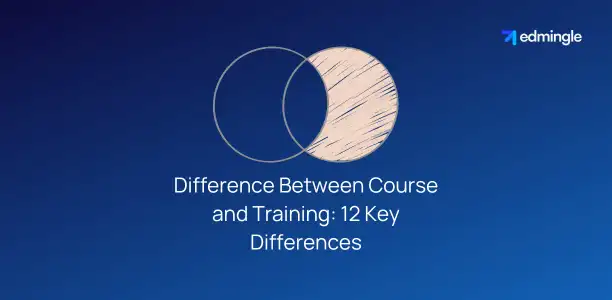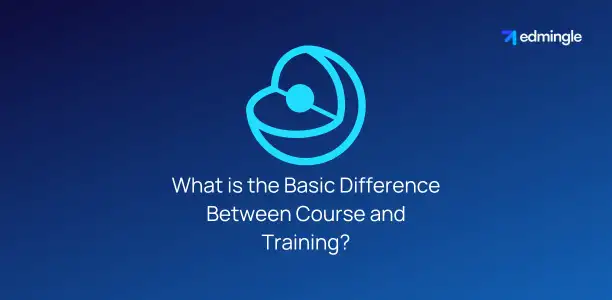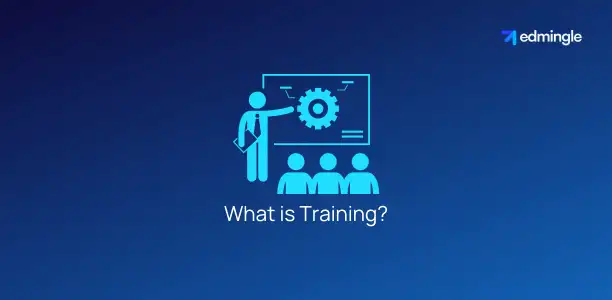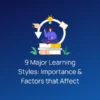
Are you wondering what sets a ‘course’ apart from ‘training’? Or have you used these terms interchangeably?
Even if you’re thinking about using them synonymously, hold on.
While they may seem similar. Understanding the difference between course and training is crucial. Especially from the perspective of skill development or career advancement.
In this blog post, we’ll dive into the heart of this often-confused topic. And ultimately help you devise clear strategies for your programs.
What is the Basic Difference Between Course and Training?

The basic difference between training and course lies in their objectives. Furthermore in their content and approach.
A course is typically more structured and academic in nature. It’s designed to impart theoretical knowledge and comprehensive understanding of a subject.
- It often follow a syllabus. And are conducted over a longer period. They may culminate in a certification or degree. These are more about providing in-depth knowledge in a particular field of study.
Training, on the other hand, is more practical and skill-focused. It is designed to develop specific skills or competencies. Majority of which are needed for a job or specific activity.
- Its usually more hands-on, shorter in duration. And more directly applicable to real-world scenarios. It’s about learning how to do something. Its often more task or process-oriented.
Also Read: Difference Between Learning and Training.
What is a Course?

A course is an educational program. It’s designed to impart extensive knowledge and understanding of a specific subject area.
It typically follows a structured syllabus. And is aimed at providing a comprehensive learning experience.
These often focus on theoretical aspects. Thus, offering a deep dive into concepts, principles, and frameworks.
Characteristics of a Course
- Structured Learning: These follow a predefined curriculum. One that systematically covers various aspects of a subject.
- Duration: They can vary in length, ranging from a few weeks to several years. This depends on the depth of study.
- Certification: Often culminates in a certificate, diploma, or degree. Thus, serving as a testament to the knowledge gained.
- Assessment: Includes regular evaluations, like exams or assignments. In order to gauge understanding and progress.
- Theoretical Emphasis: Focuses on providing comprehensive theoretical knowledge. Along with some practical elements depending on the subject.
Types of Course
- Academic: These are often part of a degree program. Generally at educational institutions like universities and colleges.
- Online Courses: Offered digitally. These can be self-paced and accessible from anywhere.
- Vocational Courses: Focuses on specific trades or professions. Combining theory with practical skills.
- Continuing Education Courses: Designed for professionals looking to update their knowledge in a specific field.
What is Training?

It refers to a program designed to develop specific skills or competencies. Majorly, crucial for performing certain tasks or jobs.
It is highly practical and focuses on applying knowledge in real-world scenarios. And is more about learning how to do something. Moreover, its often direct and task-oriented.
Characteristics of Training
- Practical Focus: Emphasizes hands-on experience and real-world application of skills.
- Short Duration: Typically concise. Aimed at quickly imparting specific skills.
- Specific Objectives: It is goal-oriented. Focused on achieving competence in a particular area.
- Flexible Format: Can be offered in various formats, including workshops, seminars, and online modules.
- Immediate Application: Designed for immediate implementation of skills in a work or operational setting.
Types of Training
- On-the-Job Training: Practical training sessions given in the working environment.
- Workshops and Seminars: Short-term training sessions focusing on specific skills or knowledge areas.
- Online Programs: Digital platforms offering skill-based training, accessible remotely.
- Corporate: Tailored for professionals to enhance job-specific skills or company procedures. An LMS for professional development may be used to for its delivery.
- Safety and Compliance Training: Focused on ensuring adherence to regulations and safe practices in workplaces.
This breakdown clarifies their distinct roles and attributes. Thereby, highlighting how they cater to different learning needs and objectives.
Read Also: Difference Between Education and Training.
12 Key Difference Between Training and Course (Course vs Training)
The table below highlights the difference between course and training under 12 aspects.
| Aspect | Course | Training |
|---|---|---|
| Objective | To provide comprehensive knowledge in a subject. | To develop specific skills or competencies. |
| Focus | Theoretical understanding and depth. | Practical application and skill acquisition. |
| Content | Broad and structured curriculum. | Focused on particular tasks or job skills. |
| Duration | Longer, can range from weeks to years. | Shorter, often completed in days or weeks. |
| Methodology | Systematic, academic approach. | Hands-on, experiential learning. |
| Assessment | Exams, essays, and projects. | Performance evaluations, practical tests. |
| Certification | Often leads to a degree or certificate. | May or may not include a certification. |
| Environment | Classroom-based, online, or hybrid. | Workshops, on-site, online, or in-field. |
| Customization | Generally follows a set curriculum. | Highly customizable to specific job needs. |
| Outcome | Academic qualification or knowledge gain. | Immediate skill application and proficiency. |
| Target Audience | Students, academics, lifelong learners. | Employees, professionals, job trainees. |
| Application | Broadly applicable to a field of study. | Direct application to specific tasks or roles. |
We now understand clearly the difference between course and training. This will ensure our strategies are clearly devised to drive in the desired results.
Conclusion
As we conclude this exploration of the difference between course and training. It’s clear that while these terms serve distinct purposes.
This blog has shed light on the structured, theory-focused nature of courses. Ideal for those seeking comprehensive knowledge in a specific field.
On the other hand, the latter, with its practical, skill-oriented approach. Its tailored for immediate application in specific tasks or jobs.
Understanding these differences is more than just an exercise of words. It’s about making informed choices in crafting learning journeys. And choosing a path that aligns with your goals.
FAQs on the Differences Between Training and Course
1.When is a course more beneficial than training?
A course is more beneficial when deep, comprehensive knowledge in a field is required. For instance, academic pursuits, research, or a career requiring extensive background theory. This may include fields like medicine or engineering. The latter is less beneficial in these contexts due to its practical, skill-focused nature.
2.In what scenarios is training preferred over taking a course?
It is preferred when gaining specific skills or competencies quickly. Such as learning a new software tool, emergency response techniques. Or customer service & new language skills. Since it is more practical and directly applicable to specific tasks or job roles. It becomes ideal for immediate skill application.
3.Is it possible to find programs that combine both courses and training?
Many educational and professional development programs blend both elements. Offering theoretical knowledge through courses and practical skills through training. This combination is particularly common in vocational education and corporate programs.






Leave a Reply